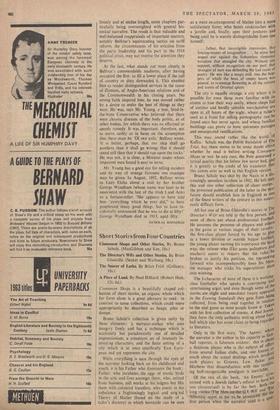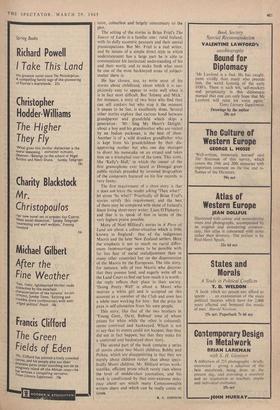Short Stories from Four Countries
Cinnamon Shops and Other Stories. By Bruno Schulz. (MacGibbon and Kee, 18s.) The Director's Wife and Other Stories. By Brian (Secker and Warburg, 18s.) Cinnamon Shops is a beautifully shaped col- • lection of short stories, an organic whole which for form alone is a great pleasure to read: in contrast to some collections, which could more appropriately be described as heaps, piles or dumps.
Bruno Schulz's collection is given unity by three elements: a narrator-author who uses imagery freely and has a technique which is accurately but paradoxically one of detailed impressionism; a consistent set of intensely in- terest:ng characters; and the finite setting of a city which is at once specifically East Euro- pean and yet represents the city.
While everything is seen through the eyes of the narrator looking back on his childhood and youth. it is his Father who dominates the book: Father, who incubates the eggs of exotic birds in the attic and lives amongst them; who, retired from business, still works at his ledgers but fills them with coloured transfers; who erects in his imbalance a frighteningly logical and original Theory of Matter (based on the study of a tailor's dummy) in which homicide can be seen as a mere re-arrangement of Matter into a more satisfactory form; who hunts cockroaches with a javelin and, finally, apes their postures and being until he is scarely distinguishable from One himself :
. . father, that incorrigible improviser, that fencing-master of imagination . -. he alone had waged war against the fathomless elemental boredom that strangled the city. Without anY support, without recognition on our part, that strangest of men was defending the lost cause of poetry He was like a magic mill, into the hop- pers of which the bran of empty hours was poured, to re-emerge flowering in all the colours and scents of Oriental spices.
The city is equally strange, a city where it is possible for even those most familiar with its streets to lose their way easily, where shops full of curious and hardly saleable merchandise are open at all hours of the night, where a tailor's used as a front for selling pornography can be found once but never again, and where familiar buildings can prove to have unknown passages and unsuspected ramifications. This may sound rather like the world of Kafka: Schulz was the.Polish translator of The Trial,, but .there seems to be some doubt about whether he read it before writing Cinnamon Shops or not. In any case, the Pole possessed 3 lyrical quality that his fellow Jew never had. and it is greatly to the credit of his translator that this comes over so well in this English version. Bruno Schulz was shot by the Nazis in a dis- tressingly senseless incident in 1.942. Heleft onlY this and one other collection of short stories' the promised publication of the latter in the near future should establish him in England as one of the finest writers of the century in this notori-
ously difficult form.. ,
All but one of Brian Glanville's stories in The, Director's Wife are told in the first person. a" most of them are about professional football. He assumes the persona: . of players and others in the game at various stages of their careers: the first-class player forced by his age to PIO in a lower division or outside league football! the young player earning his experience the hard way, the referee who (Eke some policemen and teachers) seems to require that the rules 'be broken to justify his position, the top-scoring forward who incomprehensibly loses his forrrh the manager who tricks his superstitious team into winning. The I-character of most of these is a woi king; class footballer who speaks a convincing l:_ entertaining argot, and even though some of tlic7 stories are slight and anecdotal (many appeared in the Evening Standard) they gain from bein,,,b collected, from being read together in relati°".., to the real game as most people know it. Take: with his first collection of stories, A Bad Streak, they form the only authentic writing about foot, ball which also has some claim to being regarded as literattire. Only in the first story, The Agents.' wIte_rtc, the narrator is the author in his capacity as f0 to ball reporter, is falseness evident: this is ab,:ers a fictitious player who is the subject of 01' 0 from several Italian clubs, and one knows,ve'd much about the actual dealings which inv°} „d such players as Greaves, Law. Baker a,",s, Hitchens that dissatisfaction with this tan ing half-recognisable amalgam is inevitable. 0, Of the rest of the 'book, 'An Enemy (1.10 cerned with a Jewish lather's refusal to have
Roth the son circumcised) is by far the best. Rot
long stories!The Men ora the Ci.I. Br and Athenian'..seem to inc to be unsuitable' fe th first person when the narrator used is a spec
tator, colourless and largely unnecessary to the plot.
The setting of the stories in Brian Friel's The Saucer of Larks is a famitar one: rural Ireland, with its dully eccentric peasants and their unreal preoccupations. But Mr. Friel is a real writer, and by means of a simple direct style in which understatement has a large part he is able to communicate his instinctual understanding of his and their world, and to make fresh what must be one of the most hackneyed areas of subject- matter there is.
He has chosen, too, to write most of his stories about childhood; about which it is sus- piciously easy to appear to write well when it. is in fact most difficult. But 'Johnny and Mick,' for instance, a story of two boys who find they can sell conkers but who stop it the moment it ceases to be fun, is excellently done. Several other stories explore that curious bond between grandparent and grandchild which skips a generation: 'Mr. Sing My Heart's Delight.. about a boy and his grandmother who are visited by an Indian packman, is the best of these. Another is of a wild drunken grandfather who is kept. from his grandchildren by their dis- approving mother but who one day manages to divert- his namesake on an errand and lakes him on a triumphal tour of the town. This story, like 'Kelly's. Hall,' in which the owner of the first gramophone ever heard in Donegal gives public recitals preceded by invented biographies of the composers featured on his few records. is very funny.
The first requirement of a short story is that it does not leave the reader asking 'Then what?'. let alone 'So what?' Practically all Brian Friel's stories satisfy this requirement, and the best of them may be compared with those of Ireland's finest living short-story writer, Liam O'Flaherty: and that is to speak of him in terms of the very highest praise possible.
Many of Noel Hilliard's stories in A Piece of Land are about a colour-situation which is little known in England: that of the indigenous Maoris and the later New Zealand settlers. Here the emphasis is not so much on racial differ- ences (intermarriage seems to be possible with far less fear of social maladjustment than in many other countries) but on the dispossession of the Maoris by the Europeans. The title story. for instance, tells of two Maoris who discover that they possess land, and eagerly write off to the Land Court to find out how much it is worth: the reply reflects their place in their soc'ety. 'Doing Pretty Well' is about a Maori who marries a white girl and is accepted on this account as a member of the Club and even has a white man working for him: but the price he pays is self-alienation from his own people.
This story, like that of the two brothers in 'Young Gent., Qu'et, Refined' (one of whom passes for white while the other is coloured), seems contrived and hackneyed. Which is not to say that its events could not happen, that they did not in fact happen, but that they make for a contrived and hackneyed short story.
The second part of the book contains a series of stories about two Maori children, Hubby and Paikea, which 'are disappointing in that they are merely about children rather than about speci- fically Maori children. Mr. Hilliard writes work- manlike, efficient prose which rarely rises above the level of middle-class journalism, and his work is conditioned by that over-extreme retic- ence about sex which many Commonwealth writers share and which can be really comic at times.
B. S. JOHNSON















































 Previous page
Previous page